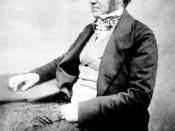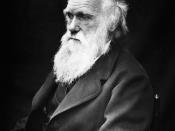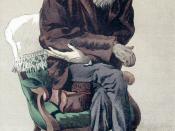In acknowledgment of the scientific accomplishments of Charles Robert Darwin, his noble face is printed on the English ten pound note, crumpled in wallets country-wide. And yet, his great achievements in the field of science have always deemed him the foil of philosophy and traditional aesthetics. Contrary to this popular assumption, On the Origin of Species is not only a colorfully and intimately written book, with poetic flashes of feeling and an intelligent style, it is a philosophy. Darwin believed that members of a species have the ability to adapt to changes in their environment. Those species that do adapt will have a tendency to outlive those members of the same species who have not developed these adaptations. This is the primary idea behind natural selection also known as the "survival of the fittest." At first glace, Romanticism seems the direct opposite to "Darwinism" (a phrase not coined by Darwin himself).
The Romantic conception and veneration of nature, created by God and presided over by humans, seems irreconcilable with the "survival of the fittest" concept attributed to Darwin. But this idea is a misconception by those who have not read, or have misunderstood, On the Origin of Species. In fact, Darwin has created a kind of "neo-Romanticism" based on reason and scientific understanding rather than religion, art and imagination.
On the Origin of Species, written autobiographically, initiates a very personal, insightful quest based on feelings, sensations, experience and logic. These feelings were part of the Romantic movement that influenced Darwin during his formative years. Lacking the scientific evidence of genetics to back his theory, the book concentrates on Darwin's experiences of nature and details the deductions he made from the lengthy period he spent researching in nature. In this approach, he is not too far removed from the Romantics.


